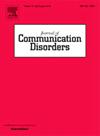Validity of a new parent-report instrument determining the developmental language level and verbal status of children with communication disorders in Cyprus
IF 2.1
3区 医学
Q2 AUDIOLOGY & SPEECH-LANGUAGE PATHOLOGY
引用次数: 0
Abstract
The validity and reliability of the new parent-report questionnaire Developmental/Verbal Language Phase (DeVLP) was examined, in determining the developmental language phase (DLP) and nonverbal/minimally verbal (NV/MV) linguistic status of children with communication disorders. The scarcity of parent-report linguistic tools in Greek/Cypriot Greek emphasized its need.
Fifty 3–12-year-old children receiving private speech-language therapy in Cyprus participated through convenience sampling. Data was collected online between February 20 and June 23, 2023, regarding epidemiological, family, perinatal, developmental, and linguistic information. For criterion-referenced validity, parents’ and speech-language pathologists’ (SLPs) responses for 64.0 % of the sample were compared to the language sample analysis (LSA) by independent SLPs. For test-retest reliability, parent results were compared at two time-points, and for inter-rater reliability, with SLPs’ results.
DeVLP demonstrated strong validity for DLP both by parents and SLPs in all language domains (PCC=0.72–0.96, p < .05), compared to LSA. For NV/MV status, parents presented strong validity in overall language (PCC=0.79, p < 0.05), in contrast to weak validity by SLPs (PCC=0.39, p < .05). With excellent specificity (100 %) and sensitivity at 67 %, it displayed an 83 % probability of distinguishing between NV/MV and verbal status in children. Reliability was good-to-excellent (ICC=0.74–1.00, p < .05) across all domains and overall language.
The questionnaire was relatively valid and strongly reliable in determining the DLP and verbal status of Cypriot children with communication disorders. It offered potential clinical utility within evaluation protocols for language assessment and uniform identification of NV/MV status. Future research is needed to verify validity, especially for children with autism.

一项新的家长报告工具的有效性,确定塞浦路斯有沟通障碍的儿童的语言发展水平和语言状况
本研究采用新的父母报告问卷“发展/言语语言阶段”(DeVLP),对交流障碍儿童的发展语言阶段(DLP)和非语言/最低言语(NV/MV)语言状况进行了效度和信度检验。希腊文/塞浦路斯文父母报告语言工具的缺乏强调了这种需要。在塞浦路斯接受私人言语语言治疗的50名3 - 12岁儿童通过方便抽样参与。在2023年2月20日至6月23日期间在线收集有关流行病学、家庭、围产期、发育和语言信息的数据。在标准参照效度方面,将64.0%的家长和语言病理学家(slp)的回答与独立slp的语言样本分析(LSA)进行比较。对于重测信度,父母的结果在两个时间点进行比较,对于评分者之间的信度,与slp的结果进行比较。在所有语言领域中,父母和孩子对DLP的有效度都很高(PCC= 0.72-0.96, p <;.05),与LSA相比。对于NV/MV状态,父母的整体语言效度较强(PCC=0.79, p <;0.05),而slp的弱效度(PCC=0.39, p <;. 05)。它具有极佳的特异性(100%)和67%的敏感性,在儿童中区分NV/MV和语言状态的概率为83%。信度从良至优(ICC= 0.74-1.00, p <;.05)跨越所有领域和整体语言。问卷相对有效,在确定有沟通障碍的塞浦路斯儿童的DLP和语言状况方面具有很强的可靠性。它在语言评估和统一识别NV/MV状态的评估方案中具有潜在的临床应用价值。需要进一步的研究来验证其有效性,特别是对自闭症儿童。
本文章由计算机程序翻译,如有差异,请以英文原文为准。
求助全文
约1分钟内获得全文
求助全文
来源期刊

Journal of Communication Disorders
AUDIOLOGY & SPEECH-LANGUAGE PATHOLOGY-REHABILITATION
CiteScore
3.30
自引率
5.90%
发文量
71
审稿时长
>12 weeks
期刊介绍:
The Journal of Communication Disorders publishes original articles on topics related to disorders of speech, language and hearing. Authors are encouraged to submit reports of experimental or descriptive investigations (research articles), review articles, tutorials or discussion papers, or letters to the editor ("short communications"). Please note that we do not accept case studies unless they conform to the principles of single-subject experimental design. Special issues are published periodically on timely and clinically relevant topics.
 求助内容:
求助内容: 应助结果提醒方式:
应助结果提醒方式:


